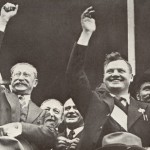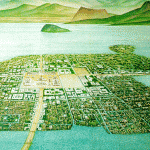
Further Letters Between Cornelius Castoriadis and Anton Pannekoek
These two letters represent a continuation of the correspondence between Cornelius Castoriadis and Anton Pannekoek, translated in our first issue with a historical introduction.

These two letters represent a continuation of the correspondence between Cornelius Castoriadis and Anton Pannekoek, translated in our first issue with a historical introduction.

On the sixteenth of April, 1984 the final demonstration of the Diretas Já campaign brought one and a half million Brazilians into the streets of São Paulo. The phrase “I want to vote for president” could be read on the protesters’ yellow t-shirts and posters. To understand the recent wave of demonstrations in Brazil, we will have to begin with the history of this reformist movement, animated by the protesters’ belief that their country had been degraded by the greed and incompetence of the politicians—a constant theme in the efforts to make our institutions more responsive to the “real Brazil.”

As I started writing from Tarlabasi, Istanbul, the police were fortifying Taksim Square to prevent peaceful protesters from entering. They were there to protest the release of the policeman who murdered one of our comrades in Ankara, Ethem Sarisuluk. He was shot in the head, and a video has been released clearly revealing the murder. Despite abundant evidence and witnesses to the contrary, courts released him on the basis of “self-defense” and will continue his trial without detention. With this decision, the partiality of the legal system in favor of the brutal police forces became obvious once again.

We can start by saying that what characterizes these protests is that they represent exactly nothing, while, for a longer or shorter time, they express and constitute everything. They have an untimely dynamic, fleeing from any model of political organization (not only the old political parties and unions, but also from the third sector, NGOs) and affirming a radical democracy articulated between networks and the streets: self-convoking and debating in social networks, massive participation in street protests, capacity and determination to confront repression, and even the capacity to construct and self-manage urban spaces, such as what happened in Tahrir Square, the Spanish encampments, the Occupy Wall Street attempts, and, finally, Taksim Square in Istanbul.

In his programmatic piece in Jacobin, Bhaskar Sunkara describes the shape of contemporary Left Unity: “the convergence of American socialists committed to non-sectarian organization under the auspices of an overarching democratic structure.” It would be glib to just dismiss this out of hand – alongside increased exposure of the Left in the mainstream media, such a structure could be a good sign. But the way this strategy is being pursued leaves many fundamental questions unanswered.

What do Ira Glass and Jean-Marie Le Pen have in common? To follow the argument of Jared Ball’s recent book I Mix What I Like, they both represent a counter-insurgency against colonized populations. The allegedly progressive NPR, writes Ball, is the contemporary equivalent of Radio-Alger, operated by the colonial French government in Algeria. From post-war Algeria to the ghettos of the United States, colonial power requires propaganda in order to function.

The $8.25 man, Bloomberg News wrote in December, has worked at McDonald’s for twenty years. Still, he can’t get forty hours a week or anything more than minimum wage. He can’t make rent payments, can’t afford a computer, and has to go to the Apple store to update his Facebook. After picking cigarette butts out of a bathroom drain, he has to clean off before his next job—at another McDonald’s.

The news from Caracas has not been promising for some time. The leader of the Bolivarian Revolution had not been seen since early December, when he travelled to Cuba to undergo emergency surgery for a still undisclosed form of cancer. On March 5, Vice President Nicolás Maduro announced that Venezuelan President Hugo Chávez died in a military hospital.

On July 1st, 2012, the day of Mexico’s recent presidential election, I visited the Museo de Arte Moderno in Mexico City, hoping to encounter a painting by Remedios Varo. A surrealist painter fleeing the Spanish Civil War, Varo was among the many notable exiles to make their home in Mexico City during the mid-20th century. I hoped that through one of her Cimmerian dreamscapes I might learn something about the political situation she experienced in the aftermath of the massive Mexican revolutions of 1910 to 1929. It was during the prime of her career following the end of WWII that the Institutional Revolutionary Party (PRI), inheritors of the Mexican Revolution, strayed decidedly off-course to embrace a particular brand of oligarchic and authoritarian governance. Their 71 years of uninterrupted rule ended in 2000, but as I arrived at the museum that morning their return to power, in the context of an increasingly bloody “Drug War,” was already presumed.

When Perry Anderson wrote in 1976 that “Western Marxism” could be considered a “product of defeat,” he was referring to the catastrophes and betrayals that framed the period from 1924 to 1968. In retrospect, this seems like foreshadowing. The intervening decades have seen not simply a defeat for the workers’ movement but its total dissolution – the collapse of the institutions that once made it an undeniable social force, and the rollback of the reforms it had won from the state. In our situation it has become difficult to say what “Marxism” really is, what distinguishes it as a theory, and why it matters. But this is by no means a new question. And of all the definitions and redefinitions of Marxism, Louis Althusser’s were perhaps the most controversial. In 1982, just before François Mitterrand’s turn to austerity, Althusser began to draft a “theoretical balance sheet.” He wrote “Definitive” on the manuscript, and never published it.